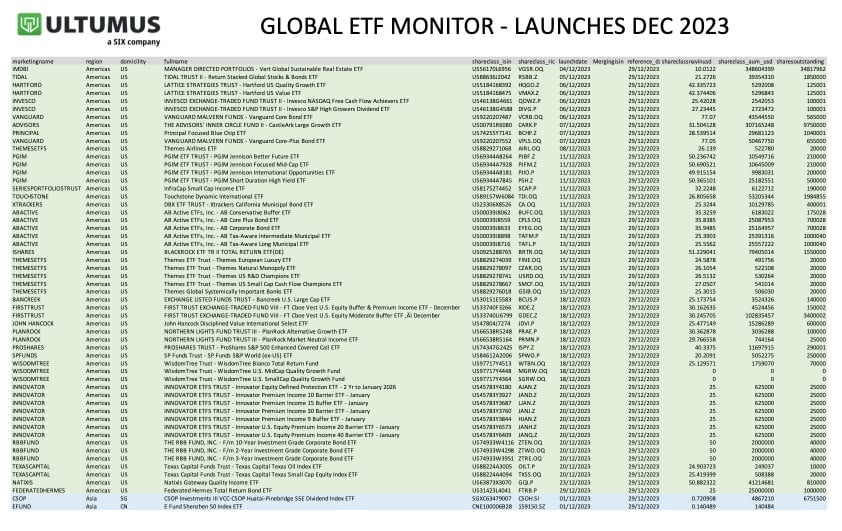USA
Meridian’s mutual funds list as ETFs
Denver-based mutual fund provider Meridian is listing four actively managed mutual fund-style ETFs with help from Exchange Traded Concepts. The four funds are:
| Ticker | Fund Name | TER |
| SIXH | 6 Meridian Hedged Equity-Index Option Strategy ETF | 0.81% |
| SIXA | 6 Meridian Mega Cap Equity ETF | 0.82% |
| SIXL | 6 Meridian Low Beta Equity Strategy ETF | 0.84% |
| SIXS | 6 Meridian Small Cap Equity ETF | 0.97% |
SIXH holds a portfolio of 50-odd US shares. It then sells out of the money calls on SPY to boost income. The 50 shares are chosen based on quality, momentum and value. The fund’s managers can take tactical positions in inverse ETFs.
SIXA is a pretty conventional smart beta product, taking US large caps selected for best factor scores. The factors it looks at are quality, growth and momentum.
SIXL is also fairly conventional. It buys high quality companies with low volatility. It has the extra wrinkle of weighting securities equally.
SIXS screens companies in the S&P 600 for quality (as measured by debt coverage) and growth. It then picks smaller companies based on value and low beta.
Analysis – smart beta peddlers should put their money where their mouth is
Cynics and Jack Bogle purists often think that smart beta is just a massive excuse for fund managers to jack up fees. None of the factors work, they claim. No smart beta ETF has beaten the market over the long-term. The research methods used to “discover” factors in are being discredited, they suggest. And if fund managers do have a proven method for harvesting alpha, they have little incentive to share it in a low-cost ETF with a transparent index methodology.
A way to satisfy the smart beta cynics, in my opinion, would be for substantial co-investment from fund managers. Under this scheme, people running and selling smart beta funds, should also be the primary ones buying them. And indeed, if smart beta funds do make investors richer rather than fund managers, what objection could they have?
So, for example, value manager who put out research about how the value premium is real - despite years of underperformance - could put 90% of his liquid net worth in their value factor funds.
To me, this is a good way to help qualm critics.
China
Another cheap China total market fund from GF
GF Fund Management, one of China’s largest asset managers, is listing a new ETF that looks something like the Chinese equivalent of the Vanguard total stock market index fund.
The newly-minted GF CSI 800 ETF (159802) will track the CSI 800 index, which provides something near total market coverage for Chinese A shares.
There is currently one CSI 800 ETF listed in Shanghai from China Universal. It charges 0.18% as an annual fee. FullGoal, another Chinese fund manager, also has a CSI 800 ETF on the way that charges 0.15%.
GF don’t say at this stage what the new funds’ expense ratio will be. But it will have to be very low.
…and a smart beta ETF from Harvest
Another major Chinese ETF provider, Harvest, is listing a smart beta ETF focussing on the “growth” factor.
The Harvest CSI 500 Growth Valuation ETF (515510) will target growth companies that are from China’s small and medium sized business index – the CSI 500.
As is often the case for new Chinese listings, there is no English language material available at this stage. We cannot get through to Harvest as we don’t speak Mandarin.




